英文对转基因食品与有机食品的观点
是否该鼓励转基因食品英语作文
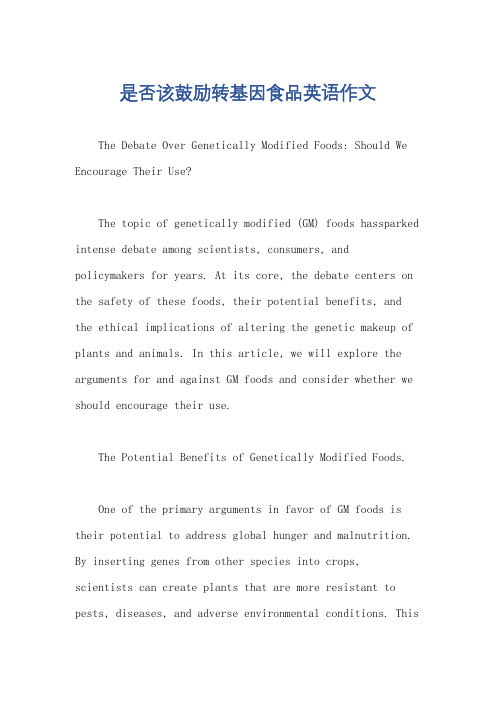
是否该鼓励转基因食品英语作文The Debate Over Genetically Modified Foods: Should We Encourage Their Use?The topic of genetically modified (GM) foods hassparked intense debate among scientists, consumers, and policymakers for years. At its core, the debate centers on the safety of these foods, their potential benefits, and the ethical implications of altering the genetic makeup of plants and animals. In this article, we will explore the arguments for and against GM foods and consider whether we should encourage their use.The Potential Benefits of Genetically Modified Foods.One of the primary arguments in favor of GM foods is their potential to address global hunger and malnutrition. By inserting genes from other species into crops,scientists can create plants that are more resistant to pests, diseases, and adverse environmental conditions. Thiscould lead to higher yields and more reliable food sources in areas where crop failure is common.Additionally, GM foods can be engineered to contain higher levels of nutrients. For example, scientists have developed GM rice that is enriched with beta-carotene, a precursor to vitamin A, which can help combat vitamin A deficiency in developing countries. Similarly, GM crops can be designed to have lower levels of harmful substances, such as toxins or allergens, making them safer for human consumption.Concerns About the Safety and Ethics of Genetically Modified Foods.Despite the potential benefits, there are significant concerns about the safety and ethics of GM foods. One major concern is the long-term ecological impact of introducing genetically modified organisms (GMOs) into the environment. GM crops could interact with wild relatives and create new, potentially invasive, species. Furthermore, the long-term effects of consuming GM foods on human health are still notfully understood.Ethical concerns also arise from the practice ofgenetic modification. Some argue that playing God byaltering the genetic code of plants and animals isunethical and goes against the natural order. Others fear that GM foods may lead to the loss of biodiversity as farmers rely increasingly on a few genetically modified varieties rather than maintaining a diversity of crop types.The Role of Regulation and Consumer Choice.In addressing these concerns, a balanced approach is needed. Strict regulatory frameworks should ensure that GM foods are safe for human consumption and environmentally responsible. This includes rigorous testing and monitoringof GM crops to assess their impact on human health, ecosystems, and biodiversity.Moreover, consumers should have the right to choose whether they want to consume GM foods or not. Labeling laws that clearly indicate whether a product contains GMOs canhelp consumers make informed decisions about their food purchases. This approach respects consumer preferences and promotes transparency in the food supply chain.Conclusion.The debate over genetically modified foods is complex and multifaceted. While GM foods have the potential to address global hunger and malnutrition, there are also concerns about their safety, environmental impact, and ethical implications. A balanced approach that combines strict regulation, consumer choice, and ongoing research is needed to ensure that GM foods are safe, sustainable, and beneficial for society.Encouraging the use of GM foods is not a simple yes or no question. Instead, it requires a nuanced understanding of the science, social implications, and consumer preferences involved. By taking a balanced and responsible approach, we can harness the potential benefits of GM foods while minimizing their risks and ensuring that they serve the best interests of society and the environment.。
有机食品与转基因食品的比较

GM food not only has low investment and high output value, but also has great contribution to solve the food problem.
Views on GM food and organic food
The comparative analysis of both GM food and organic food
LOGO
Contents
1 Definition odvantages and disadvantages
of GM food
3
Views on GM food and organic food
Definition of GM and organic food
Definition
GM foods
Organic food
GM food
• Genetically modified food refers to the genetically modified organism strain obtained by the use of GM technology, and the food processed and produced with the GM organism as direct food or raw material is called GM food.
英语考试作文-雅思大作文写作范文——转基因食物是好是坏?
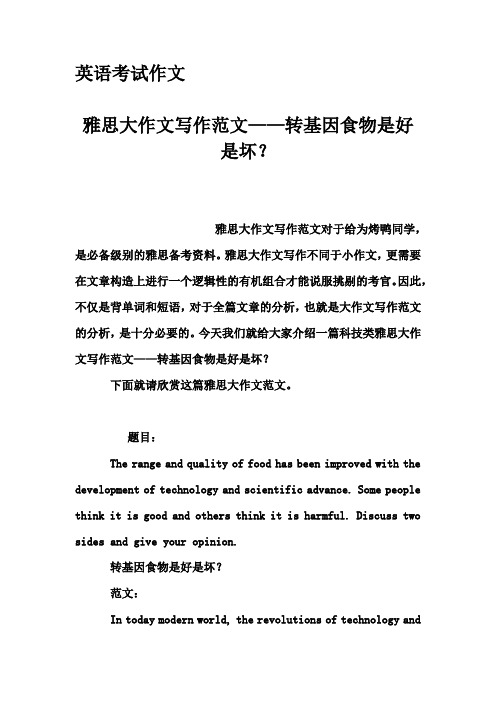
英语考试作文雅思大作文写作范文——转基因食物是好是坏?雅思大作文写作范文对于给为烤鸭同学,是必备级别的雅思备考资料。
雅思大作文写作不同于小作文,更需要在文章构造上进行一个逻辑性的有机组合才能说服挑剔的考官。
因此,不仅是背单词和短语,对于全篇文章的分析,也就是大作文写作范文的分析,是十分必要的。
今天我们就给大家介绍一篇科技类雅思大作文写作范文——转基因食物是好是坏?下面就请欣赏这篇雅思大作文范文。
题目:The range and quality of food has been improved with the development of technology and scientific advance. Some people think it is good and others think it is harmful. Discuss two sides and give your opinion.转基因食物是好是坏?范文:In today modern world, the revolutions of technology andscience have an impact on many aspects of life including the standard and different kinds of food we consume. However, there is some controversy about the effect of those changes. While it is possible to claim that these effects are improvement, my view is that the disadvantages outweigh the advantages.在当今的现代世界,技术和科学的革命影响了生活的许多方面,包括我们消费的标准和不同种类的食物。
关于转基因食品的英语作文150字
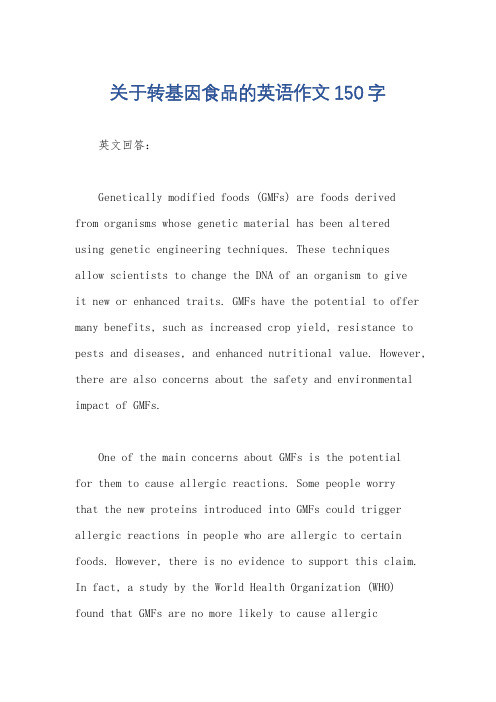
关于转基因食品的英语作文150字英文回答:Genetically modified foods (GMFs) are foods derivedfrom organisms whose genetic material has been alteredusing genetic engineering techniques. These techniquesallow scientists to change the DNA of an organism to giveit new or enhanced traits. GMFs have the potential to offer many benefits, such as increased crop yield, resistance to pests and diseases, and enhanced nutritional value. However, there are also concerns about the safety and environmental impact of GMFs.One of the main concerns about GMFs is the potentialfor them to cause allergic reactions. Some people worrythat the new proteins introduced into GMFs could trigger allergic reactions in people who are allergic to certain foods. However, there is no evidence to support this claim. In fact, a study by the World Health Organization (WHO) found that GMFs are no more likely to cause allergicreactions than conventional foods.Another concern about GMFs is the potential for them to harm the environment. Some people worry that GMFs could escape into the environment and cross-pollinate with wild plants, creating new superweeds that are resistant to herbicides. However, there is no evidence to support this claim. In fact, a study by the National Academy of Sciences found that GMFs are not more likely to escape into the environment than conventional crops.Overall, the evidence suggests that GMFs are safe for human consumption and the environment. However, more research is needed to address the concerns that people have about them.中文回答:转基因食品是指利用基因工程技术改变了其遗传物质的生物所产生的食品。
转基因食品的利与弊 英语作文

转基因食品的利与弊英语作文英文回答:As for the pros of genetically modified (GM) foods, there are a few points to consider. First of all, GM foods can help to increase crop yields, which is essential for feeding the growing global population. For example, scientists have developed GM crops that are resistant to pests and diseases, allowing farmers to produce more food on the same amount of land. This can help to reduce food shortages and improve food security in many parts of the world.Another advantage of GM foods is that they can be engineered to have a longer shelf life, which can reduce food waste. For instance, GM tomatoes have been modified to ripen more slowly, leading to less spoilage and longer storage times. This can be particularly beneficial in developing countries where access to refrigeration and proper storage facilities is limited.Furthermore, GM foods have the potential to be more nutritious and healthier. Scientists have been able to enhance the nutritional content of certain crops, such as adding more vitamins and minerals to rice. This can be especially beneficial for populations that suffer from malnutrition and dietary deficiencies.On the other hand, there are also some drawbacks to consider when it comes to GM foods. One of the main concerns is the potential for unintended harm to the environment and human health. For example, there is a fear that GM crops could crossbreed with wild plants, leading to the spread of modified genes into natural ecosystems. Additionally, there are worries about the long-term effects of consuming GM foods, as the full impact on human healthis not yet fully understood.Another drawback is the potential for corporate control over the food supply. Many GM seeds are patented by biotechnology companies, which can lead to a monopoly on the market and limited options for farmers. This can havenegative implications for small-scale farmers who may become dependent on a single company for their seeds and agricultural inputs.In conclusion, GM foods have the potential to address some of the world's food security and nutrition challenges, but they also come with potential risks to the environment and human health, as well as concerns about corporate control. It is important to carefully weigh the pros and cons of GM foods and consider the ethical, social, and environmental implications before fully embracing this technology.中文回答:说到转基因食品的利与弊,有一些要考虑的观点。
有机食品与传统食品区别的英语作文
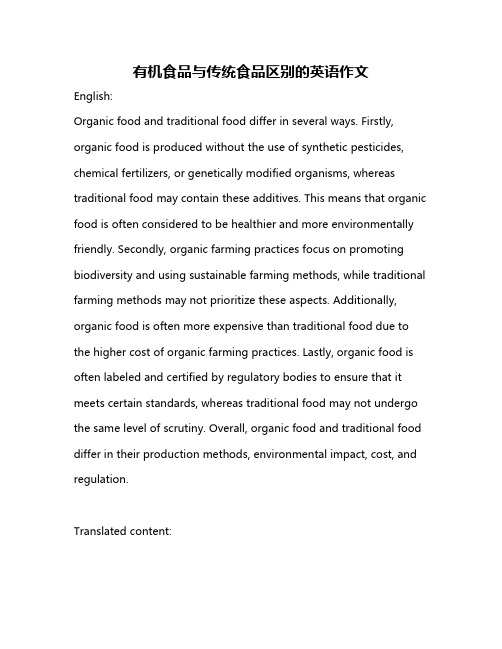
有机食品与传统食品区别的英语作文English:Organic food and traditional food differ in several ways. Firstly, organic food is produced without the use of synthetic pesticides, chemical fertilizers, or genetically modified organisms, whereas traditional food may contain these additives. This means that organic food is often considered to be healthier and more environmentally friendly. Secondly, organic farming practices focus on promoting biodiversity and using sustainable farming methods, while traditional farming methods may not prioritize these aspects. Additionally, organic food is often more expensive than traditional food due to the higher cost of organic farming practices. Lastly, organic food is often labeled and certified by regulatory bodies to ensure that it meets certain standards, whereas traditional food may not undergo the same level of scrutiny. Overall, organic food and traditional food differ in their production methods, environmental impact, cost, and regulation.Translated content:有机食品和传统食品在几个方面存在差异。
(英文PPT)对转基因食品与有机食品的观点
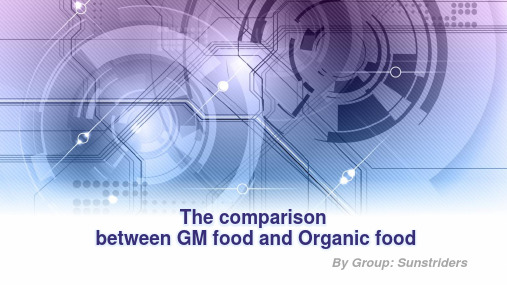
Contrast
Increase crop yield and reduce cost
Less pests and virus for crops
Nonuse of genetic technology
Ban food additives
Unknown effects on human health
The comparison between GM food and Organic food
By Group: Sunstriders
Content
Definitions of GM food and organic food
Comparisons
Attitudes and viewpoints
Abundance of nutrient materials
Eco-friendly
International attitudes
Western countries African countries
European countries
Asian countries
Viewpoints
For genetically modified food • As far as I’m concerned, genetically modified food can indeed meet some needs that people want, but meanwhile, the GM food security should be paid more attention to because of the risk of unclear effects. For organic food • To our knowledge, the organic food is worth practical production. And we are more likely to choose it if organic food can be more productive and beneficial to our bodies. Organic food still needs promotion and improvements.
转基因食品看法英文作文

转基因食品看法英文作文英文:Transgenic foods, commonly referred to as genetically modified organisms (GMOs), have sparked intense debates globally. These discussions often revolve around their safety, ethical implications, and impact on the environment and economy. My view on transgenic foods is nuanced, considering both the potential benefits and concerns associated with their widespread use.On one hand, transgenic foods have the potential to address various agricultural challenges. For instance, genetically modified crops can be engineered to resistpests and diseases, reducing the need for harmful pesticides. This not only improves crop yields but also minimizes the environmental damage caused by conventional farming practices. In regions with food scarcity,genetically modified crops engineered for increased nutritional value could help combat malnutrition and hunger.Moreover, transgenic foods have the potential to enhance food security by increasing resilience to climate change. Through genetic modification, crops can be made more drought-tolerant or capable of thriving in poor soil conditions, ensuring stable yields even in adverse environmental conditions.However, despite these potential benefits, concerns regarding the safety of transgenic foods persist. Some argue that the long-term health effects of consuming genetically modified organisms are still uncertain. There are also worries about the potential for transgenes to spread to wild plant populations, leading to unintended ecological consequences.Additionally, the dominance of transgenic crops in agricultural systems could exacerbate issues of corporate control over seeds and agricultural practices. This raises questions about the socioeconomic impacts of widespread adoption of genetically modified crops, particularly for small-scale farmers who may become dependent on largebiotechnology corporations for seeds and agricultural inputs.In my view, the key lies in rigorous scientific research and transparent regulation to ensure the safety and responsible use of transgenic foods. While acknowledging the potential risks, I believe that genetically modified organisms can play a beneficial role in addressing global food security challenges if deployed responsibly.中文:转基因食品,通常被称为基因改造生物(GMO),在全球范围内引发了激烈的辩论。
有机食品比传统食物更健康的英语作文
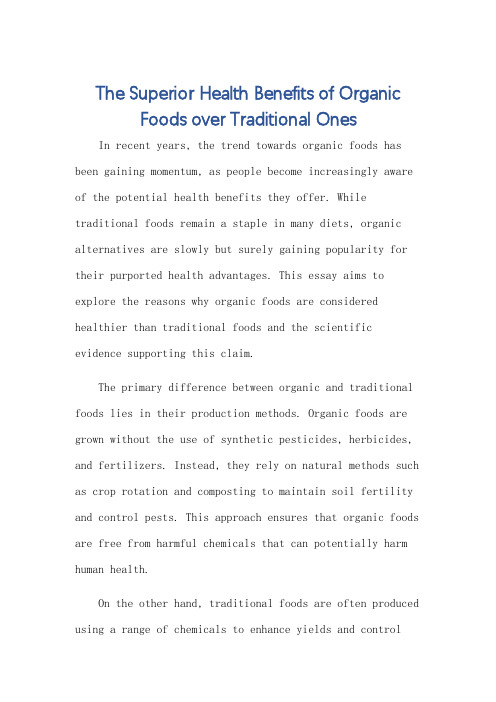
The Superior Health Benefits of Organic Foods over Traditional OnesIn recent years, the trend towards organic foods has been gaining momentum, as people become increasingly aware of the potential health benefits they offer. While traditional foods remain a staple in many diets, organic alternatives are slowly but surely gaining popularity for their purported health advantages. This essay aims to explore the reasons why organic foods are considered healthier than traditional foods and the scientific evidence supporting this claim.The primary difference between organic and traditional foods lies in their production methods. Organic foods are grown without the use of synthetic pesticides, herbicides, and fertilizers. Instead, they rely on natural methods such as crop rotation and composting to maintain soil fertility and control pests. This approach ensures that organic foods are free from harmful chemicals that can potentially harm human health.On the other hand, traditional foods are often produced using a range of chemicals to enhance yields and controlpests. While these chemicals may increase production efficiency, they can also leave residual toxins on the food, which can accumulate in the human body over time. Long-term exposure to these toxins has been linked to various health problems, including cancer, hormonal imbalances, and neurological disorders.Another key advantage of organic foods is their higher nutritional value. Studies have shown that organic produce contains significantly higher levels of vitamins, minerals, and antioxidants than conventionally grown foods. These nutrients are essential for maintaining good health and fighting against chronic diseases. By consuming organic foods, individuals can ensure that they are getting the maximum amount of nutrients from their diet.Moreover, organic foods are also believed to be more flavorful and tasty than traditional foods. This is because organic produce is grown under optimal conditions, allowing them to develop their natural flavors and textures. In contrast, conventionally grown foods may be harvestedbefore they are fully ripe or may have been stored forextended periods, resulting in a loss of flavor and freshness.In conclusion, the evidence suggests that organic foods offer a range of health benefits over traditional foods. They are free from harmful chemicals, contain higher levels of nutrients, and are generally more flavorful and tasty. While organic foods may be more expensive and less widely available than traditional foods, their health benefits make them a worthwhile investment for those seeking to improve their overall health and well-being.**有机食品比传统食物更健康的理由**近年来,有机食品的趋势逐渐增强,因为人们越来越意识到它们可能带来的健康益处。
英文对转基因食品与有机食品的观点
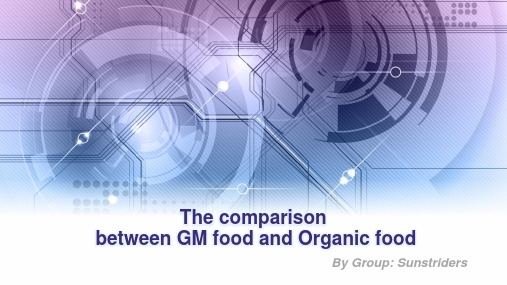
Genetically Modified Food
Genetically modified (GM) food is processed by genetically modified organisms, which transfer one or several exogenous (外源 性) genes into certain living organism through genetic engineering technology to make it express the corresponding products (peptide or protein).
African countries
European countries
Asian countries
Viewpoints
For genetically modified food
• As far as I’m concerned, genetically modified food can indeed meet some needs that people want, but meanwhile, the GM food security should be paid more attention to because of the risk of unclear effects.
THANKYOU
批注本地保存成功开通会员云端永久保存去开通
The comparison between GM food and Organic food
By Group: Sunstriders
Content
Definitions of GM food and organic food Comparisons
转基因食品的英语作文

转基因食品的英语作文英文回答:As for genetically modified (GM) foods, I have quite a mixed opinion. On one hand, I understand the potential benefits of GM foods, such as increased crop yield and resistance to pests and diseases. This can be especially important in areas where food shortages are a major issue. For example, in some parts of Africa, GM crops have been developed to withstand drought and pests, which can help to ensure a more reliable food supply.However, on the other hand, I also have concerns about the potential risks and long-term effects of consuming GM foods. There is still ongoing debate and research about the safety of GM foods, and some studies have raised questions about their potential impact on human health and the environment. For instance, there are worries about the effects of GM crops on biodiversity and the potential for unintended consequences, such as the development ofsuperweeds or the harm to non-target insects.In addition, there are also ethical and economic considerations to take into account. For example, there are concerns about the control of GM seeds by large corporations and the potential impact on small-scale farmers. Moreover, there are questions about the labeling of GM foods and the consumer's right to know what they are eating.In conclusion, while I can see the potential benefits of GM foods, I also believe that it is important to proceed with caution and to continue researching and monitoring the impact of GM foods on human health and the environment.中文回答:对于转基因食品,我有着各种不同的看法。
什么是有机食品英语作文

什么是有机食品英语作文English:Organic food refers to food products that are grown without the use of synthetic pesticides, fertilizers, genetically modified organisms, or other artificial additives. Instead, organic farmers use natural methods to enrich the soil, control pests, and promote plant growth, such as crop rotation, composting, and the use of beneficial insects. Additionally, organic livestock must have access to the outdoors and be raised without the use of antibiotics or growth hormones. The goal of organic agriculture is to produce food in a way that is environmentally sustainable, promotes animal welfare, and preserves the natural biodiversity of the land.中文翻译:有机食品指的是不使用合成杀虫剂、化肥、转基因生物或其他人工添加剂生产的食品产品。
相反,有机农民使用自然方法来丰富土壤、控制害虫、促进植物生长,如轮作、堆肥和利用益虫。
此外,有机畜牧业必须具有户外活动的条件,并且在不使用抗生素或生长激素的情况下饲养。
有机农业的目标是以一种对环境可持续的方式生产食品,促进动物福利,并保护土地的自然生物多样性。
有机食物比传统食物更健康英语作文
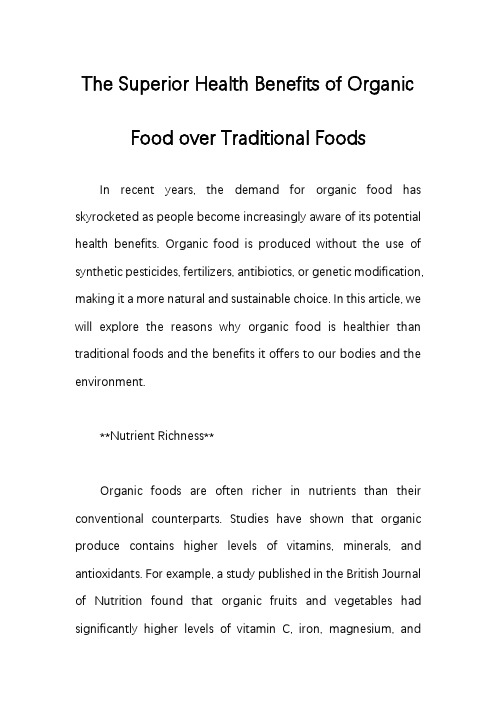
The Superior Health Benefits of Organic Food over Traditional FoodsIn recent years, the demand for organic food has skyrocketed as people become increasingly aware of its potential health benefits. Organic food is produced without the use of synthetic pesticides, fertilizers, antibiotics, or genetic modification, making it a more natural and sustainable choice. In this article, we will explore the reasons why organic food is healthier than traditional foods and the benefits it offers to our bodies and the environment.**Nutrient Richness**Organic foods are often richer in nutrients than their conventional counterparts. Studies have shown that organic produce contains higher levels of vitamins, minerals, and antioxidants. For example, a study published in the British Journal of Nutrition found that organic fruits and vegetables had significantly higher levels of vitamin C, iron, magnesium, andphosphorus compared to non-organic produce. These nutrients are essential for maintaining good health and preventing chronic diseases.**Reduced Risk of Toxic Exposure**Conventional foods are often exposed to a range of toxic chemicals during their production process. These chemicals, including pesticides, herbicides, and antibiotics, can pose a risk to human health. Organic foods, on the other hand, are grown without the use of these harmful substances, greatly reducing the risk of toxic exposure. Long-term exposure to these chemicals has been linked to various health problems, including cancer, birth defects, and neurological disorders.**Sustainability and Environmental Protection**Organic farming practices are more sustainable and environmentally friendly than conventional farming. Organic farming promotes soil health and biodiversity by using natural methods such as composting and crop rotation. This reduces soilerosion, water pollution, and the need for synthetic fertilizers and pesticides. By supporting organic farming, we can help protect the environment and mitigate the negative impacts of climate change.**Flavor and Texture**Many people believe that organic foods taste better than their conventional counterparts. This is because organic produce is grown under optimal conditions, allowing it to develop its full flavor and texture. Organic animals are also raised in a more natural environment, resulting in meat and dairy products that are richer in taste and texture. Enjoying delicious and nutritious organic foods can enhance our dining experience and improve our overall quality of life.In conclusion, organic food offers numerous health benefits over traditional foods. It is richer in nutrients, reduces the risk of toxic exposure, supports sustainability and environmental protection, and enhances flavor and texture. By making the switch to organic foods, we can improve our health, protect theenvironment, and enjoy delicious and nutritious meals.**有机食物比传统食物更健康**近年来,随着人们对有机食物潜在健康益处的认识日益加深,有机食物的需求也在迅猛增长。
有机食物比传统食物更健康英语作文
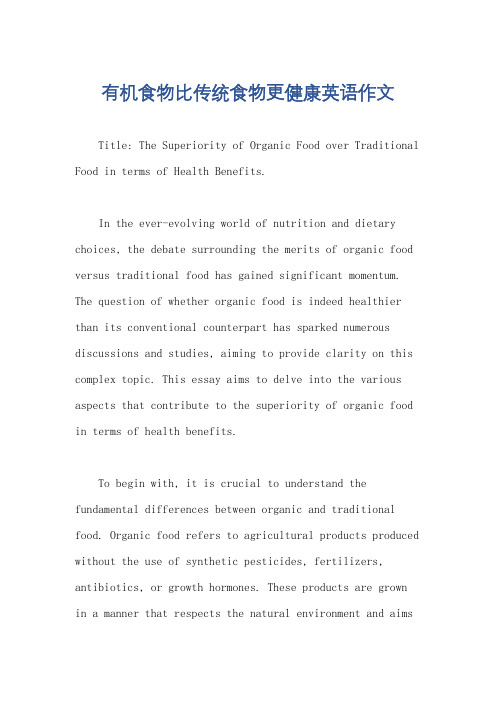
有机食物比传统食物更健康英语作文Title: The Superiority of Organic Food over Traditional Food in terms of Health Benefits.In the ever-evolving world of nutrition and dietary choices, the debate surrounding the merits of organic food versus traditional food has gained significant momentum. The question of whether organic food is indeed healthier than its conventional counterpart has sparked numerous discussions and studies, aiming to provide clarity on this complex topic. This essay aims to delve into the various aspects that contribute to the superiority of organic food in terms of health benefits.To begin with, it is crucial to understand the fundamental differences between organic and traditional food. Organic food refers to agricultural products produced without the use of synthetic pesticides, fertilizers, antibiotics, or growth hormones. These products are grownin a manner that respects the natural environment and aimsto preserve biodiversity. On the other hand, traditional food, often referred to as conventional food, is produced using modern agricultural techniques that often involve the use of chemicals and additives to enhance crop yields and prolong shelf life.One of the primary reasons why organic food is considered healthier is its reduced exposure to harmful chemicals. In traditional agriculture, synthetic pesticides and fertilizers are widely used to control pests and promote plant growth. However, these chemicals often remain in the food chain, even after harvesting and processing. Consuming foods containing these residues can have adverse effects on human health, including an increased risk of cancer, neurological disorders, and reproductive issues. Organic farming practices, on the other hand, rely onnatural methods such as crop rotation and the use oforganic manure to maintain soil fertility and control pests. This significantly reduces the risk of chemical residues in organic foods.Furthermore, organic foods tend to be richer.。
转基因食物的坏处英语作文

转基因食物的坏处英语作文英文回答:Genetically modified foods (GMFs) have emerged as a controversial topic in recent years, with concerns raised about their potential health risks and environmental impact. However, it is important to approach this issue with a balanced perspective, considering both the potentialbenefits and drawbacks of GMFs.Potential Health Risks.One of the main concerns surrounding GMFs is their potential to cause allergic reactions or other adversehealth effects in consumers. While traditional breeding methods can also introduce new allergens into the food supply, GMFs have the potential to transfer genes from one species to another, creating novel combinations that could trigger allergic responses in susceptible individuals.Moreover, the long-term health effects of consuming GMFs are still largely unknown. Some studies have suggested that certain genetically modified crops may have altered nutritional profiles or contain unintended substances that could have negative health consequences. However, it is important to note that these findings are often based on animal studies or small-scale human trials, and further research is needed to establish a definitive link between GMF consumption and adverse health effects.Environmental Concerns.GMFs have also raised concerns about their potential impact on the environment. The use of herbicide-resistant crops, for example, may lead to increased reliance on chemical weed control, which can have detrimental effects on biodiversity and soil health. Additionally, the introduction of genetically modified crops into natural ecosystems could potentially disrupt ecological balance by outcompeting native species or altering food webs.Another concern is gene transfer from geneticallymodified crops to wild relatives, creating "superweeds"that are resistant to herbicides or other pesticides. This could complicate weed management and reduce the effectiveness of chemical control methods. Moreover, the potential for genetically modified genes to spread to organic or non-GM crops through cross-pollination raises concerns about contamination and the loss of genetic diversity.Regulatory Measures.To address these concerns, regulatory agencies around the world have established strict protocols for the development and approval of GMFs. These protocols typically involve extensive safety assessments to evaluate potential health risks and environmental impact. The regulatory framework aims to ensure that GMFs meet the same safety and quality standards as conventional foods.Benefits of GMFs.Despite the concerns, GMFs also offer potentialbenefits that should be considered. Genetically modified crops can be engineered to enhance their nutritional value, increase their resistance to pests and diseases, andimprove their yield. These advancements can contribute to addressing global food security challenges and reducing the need for harmful pesticides.GMFs have also been used to create hypoallergenic foods, such as soybeans that are modified to remove allergens.This can improve the quality of life for individuals with food allergies. Additionally, genetically modified cropscan be engineered to produce therapeutic proteins or vaccines, offering potential medical advancements.Conclusion.The debate surrounding GMFs is complex and multifaceted. While there are valid concerns about potential health risks and environmental impact, it is important to approach the issue scientifically and consider the potential benefits as well. Regulatory frameworks play a crucial role in ensuring the safety and responsible use of GMFs. As researchcontinues, a balanced and informed approach will be essential to harness the potential benefits of GMFs while mitigating any risks.中文回答:转基因食品的缺点。
有机食品比传统食物更健康的英语作文
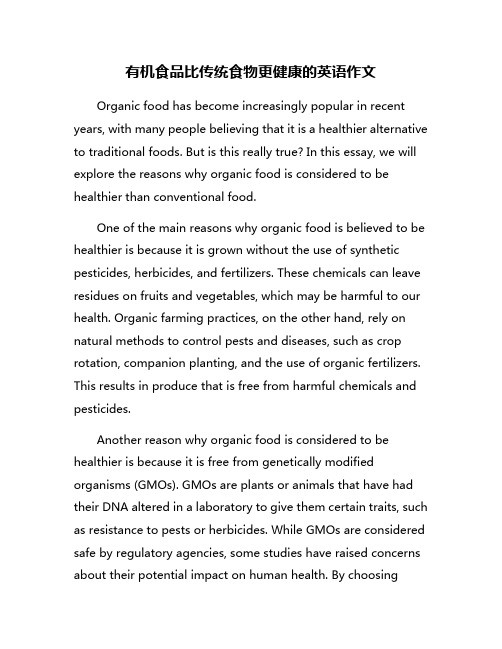
有机食品比传统食物更健康的英语作文Organic food has become increasingly popular in recent years, with many people believing that it is a healthier alternative to traditional foods. But is this really true? In this essay, we will explore the reasons why organic food is considered to be healthier than conventional food.One of the main reasons why organic food is believed to be healthier is because it is grown without the use of synthetic pesticides, herbicides, and fertilizers. These chemicals can leave residues on fruits and vegetables, which may be harmful to our health. Organic farming practices, on the other hand, rely on natural methods to control pests and diseases, such as crop rotation, companion planting, and the use of organic fertilizers. This results in produce that is free from harmful chemicals and pesticides.Another reason why organic food is considered to be healthier is because it is free from genetically modified organisms (GMOs). GMOs are plants or animals that have had their DNA altered in a laboratory to give them certain traits, such as resistance to pests or herbicides. While GMOs are considered safe by regulatory agencies, some studies have raised concerns about their potential impact on human health. By choosingorganic food, consumers can avoid GMOs and enjoy food that is free from genetic modification.Furthermore, organic food is often perceived to be more nutritious than conventional food. Studies have shown that organic fruits and vegetables may contain higher levels of certain nutrients, such as antioxidants and vitamins. This is thought to be due to the fact that organic crops are grown in healthier soil, which is rich in nutrients and beneficial microorganisms. Additionally, organic livestock are raised without the use of antibiotics or growth hormones, which may result in meat and dairy products that are higher in omega-3 fatty acids and other beneficial nutrients.In addition to the health benefits of organic food, many people also choose organic products for environmental reasons. Organic farming practices are designed to protect the health of the soil, water, and air, and to promote biodiversity. By supporting organic agriculture, consumers are helping to reduce the use of harmful chemicals and pesticides, conserve natural resources, and protect wildlife habitats. This can have a positive impact on the environment and contribute to a more sustainable food system.Despite the many benefits of organic food, it is important to note that organic does not always mean healthy. Processed organic foods, such as organic cookies, chips, and sodas, may still be high in sugar, salt, and unhealthy fats. It is always important to read labels and choose whole, unprocessed foods whenever possible, whether they are organic or conventional.In conclusion, organic food is often considered to be healthier than traditional food for a variety of reasons, including the absence of synthetic chemicals, GMOs, and higher levels of nutrients. By choosing organic products, consumers can support sustainable farming practices, protect the environment, and enjoy food that is healthy and nutritious. While organic food may be more expensive than conventional food, many people believe that the health benefits are well worth the cost.Ultimately, the choice between organic and conventional food is a personal one, but it is clear that organic food offers many advantages for those who value health and sustainability.。
转基因食品的利弊英语作文

转基因食品的利弊英语作文Genetically modified foods (GMFs) have been a topic of heated debate for many years. They are created by altering the genetic makeup of organisms to exhibit certain desirable traits. Here, we will explore the advantages and disadvantages of GMFs.Advantages of Genetically Modified Foods:1. Increased Yield: GM crops are often engineered to be more resistant to pests and diseases, which can lead to higher yields and more food production.2. Improved Nutrition: Some GMFs are designed to have enhanced nutritional content, such as rice fortified with vitamin A, which can help combat malnutrition in developing countries.3. Pest Resistance: Genetic modification can make crops resistant to common pests, reducing the need for chemical pesticides and the associated environmental damage.4. Herbicide Tolerance: GM crops can be engineered to withstand certain herbicides, allowing farmers to control weeds without harming the crop.5. Climate Resilience: Genetic modifications can make plants more tolerant to harsh conditions, such as drought or extremetemperatures, which is crucial in the face of climate change.Disadvantages of Genetically Modified Foods:1. Health Concerns: There are concerns that GMFs may have unforeseen effects on human health, although extensive research has not yet found conclusive evidence.2. Environmental Impact: The use of herbicide-tolerant crops can lead to an increase in herbicide use, potentially harming non-target organisms and ecosystems.3. Loss of Biodiversity: The widespread adoption of GM crops can lead to a reduction in agricultural biodiversity, as traditional crop varieties are replaced.4. Economic Issues: GM seeds are often patented, which can lead to increased costs for farmers and a dependence on seed companies.5. Ethical Considerations: Some people have ethical objections to the manipulation of an organism's genetic code, viewing it as "playing God."In conclusion, genetically modified foods offer potential benefits such as increased food security and improved nutrition. However, they also come with risks that need to be carefully managed. It is essential for ongoing research and regulation to ensure that the benefits of GMFs can berealized while minimizing their potential drawbacks.。
有机食品与传统食品区别的英语作文
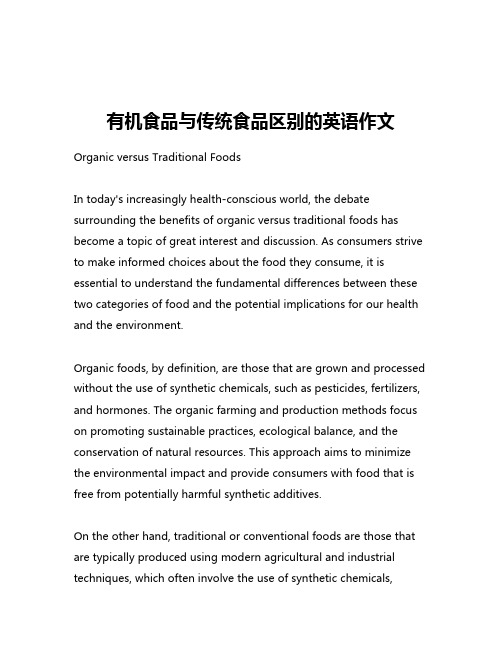
有机食品与传统食品区别的英语作文Organic versus Traditional FoodsIn today's increasingly health-conscious world, the debate surrounding the benefits of organic versus traditional foods has become a topic of great interest and discussion. As consumers strive to make informed choices about the food they consume, it is essential to understand the fundamental differences between these two categories of food and the potential implications for our health and the environment.Organic foods, by definition, are those that are grown and processed without the use of synthetic chemicals, such as pesticides, fertilizers, and hormones. The organic farming and production methods focus on promoting sustainable practices, ecological balance, and the conservation of natural resources. This approach aims to minimize the environmental impact and provide consumers with food that is free from potentially harmful synthetic additives.On the other hand, traditional or conventional foods are those that are typically produced using modern agricultural and industrial techniques, which often involve the use of synthetic chemicals,genetically modified organisms (GMOs), and other technological advancements. While these methods may increase yields and productivity, they have raised concerns about the long-term effects on human health and the environment.One of the primary distinctions between organic and traditional foods is the way they are grown and processed. Organic farming emphasizes the use of natural fertilizers, such as compost and manure, to enrich the soil and promote plant growth, while traditional farming often relies on synthetic fertilizers and pesticides. This difference can have a significant impact on the nutrient content and overall quality of the produce.Studies have shown that organic foods can contain higher levels of certain vitamins, minerals, and antioxidants compared to their traditional counterparts. For instance, organic fruits and vegetables have been found to have higher levels of vitamin C, carotenoids, and polyphenols, which are known to have beneficial effects on human health. Additionally, organic dairy products and meats may contain higher levels of omega-3 fatty acids, which are essential for maintaining a healthy heart and brain.Another crucial distinction between organic and traditional foods is the absence of synthetic additives and preservatives in organic products. Traditional foods often contain a variety of food additives,such as artificial colors, flavors, and preservatives, which are intended to extend shelf life, enhance appearance, and improve taste. However, some of these additives have been linked to potential health concerns, such as allergic reactions, hormonal disruptions, and even an increased risk of chronic diseases.Organic foods, on the other hand, are produced without the use of these synthetic additives, providing consumers with a more natural and potentially healthier alternative. This aspect of organic food production is particularly appealing to those who are concerned about the potential long-term effects of consuming a diet high in processed and chemically-treated foods.The environmental impact of organic and traditional food production is also a significant factor to consider. Organic farming practices, such as crop rotation, cover cropping, and the use of natural pest control methods, are designed to promote biodiversity and soil health, ultimately reducing the carbon footprint and environmental degradation associated with conventional farming.In contrast, traditional farming methods often involve intensive use of synthetic fertilizers and pesticides, which can lead to soil depletion, water pollution, and the loss of biodiversity. Additionally, the transportation and processing of traditional foods can contribute to higher greenhouse gas emissions and the depletion of naturalresources.It is important to note that the debate between organic and traditional foods is complex and multifaceted, with valid arguments on both sides. While organic foods may offer potential health and environmental benefits, they can also be more expensive and may not always be readily available or accessible to all consumers. Traditional foods, on the other hand, can provide a more affordable and widely accessible option, but their production methods may raise concerns about sustainability and long-term health implications.Ultimately, the decision to choose organic or traditional foods should be a personal one, based on individual preferences, budget, and the availability of local produce. By educating themselves about the differences between these two categories of food, consumers can make informed decisions that align with their values and priorities, whether it be for their own health, the environment, or a combination of both.。
有机食品比传统食品更健康英语作文
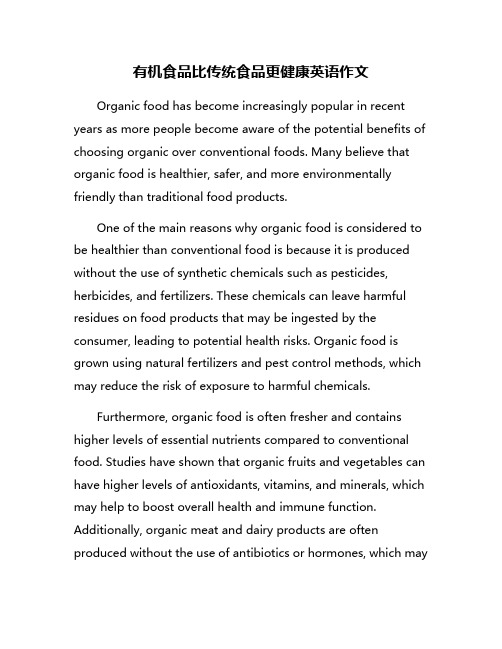
有机食品比传统食品更健康英语作文Organic food has become increasingly popular in recent years as more people become aware of the potential benefits of choosing organic over conventional foods. Many believe that organic food is healthier, safer, and more environmentally friendly than traditional food products.One of the main reasons why organic food is considered to be healthier than conventional food is because it is produced without the use of synthetic chemicals such as pesticides, herbicides, and fertilizers. These chemicals can leave harmful residues on food products that may be ingested by the consumer, leading to potential health risks. Organic food is grown using natural fertilizers and pest control methods, which may reduce the risk of exposure to harmful chemicals.Furthermore, organic food is often fresher and contains higher levels of essential nutrients compared to conventional food. Studies have shown that organic fruits and vegetables can have higher levels of antioxidants, vitamins, and minerals, which may help to boost overall health and immune function. Additionally, organic meat and dairy products are often produced without the use of antibiotics or hormones, which mayhave negative effects on human health when consumed in large quantities.In terms of safety, organic food is subjected to stricter regulations and standards compared to conventional food products. Organic farmers must adhere to specific guidelines and practices to ensure that their products are free from genetically modified organisms (GMOs) and artificial additives. This may give consumers greater peace of mind knowing that the food they are consuming is free from potentially harmful substances.From an environmental perspective, organic farming practices are often more sustainable and less damaging to the environment compared to conventional agriculture. Organic farmers prioritize soil health, biodiversity, and conservation, using methods such as crop rotation, composting, and natural pest control to maintain healthy ecosystems. Additionally, organic farms typically use less water and energy, and produce less pollution compared to conventional farms.In conclusion, choosing organic food over traditional food products may offer a range of health benefits, as well as potential environmental advantages. While organic food may sometimes be more expensive than conventional options, manypeople believe that the long-term health benefits and positive impacts on the environment make it a worthwhile investment. Ultimately, making informed decisions about the food we consume can have a significant impact on our health and well-being, as well as the health of the planet.。
- 1、下载文档前请自行甄别文档内容的完整性,平台不提供额外的编辑、内容补充、找答案等附加服务。
- 2、"仅部分预览"的文档,不可在线预览部分如存在完整性等问题,可反馈申请退款(可完整预览的文档不适用该条件!)。
- 3、如文档侵犯您的权益,请联系客服反馈,我们会尽快为您处理(人工客服工作时间:9:00-18:30)。
African countries
European countries
Asian countries
Viewpoints
For genetically modified food
• As far as I’m concerned, enetically modified food can indeed meet some needs that people want, but meanwhile, the GM food security should be paid more attention to because of the risk of unclear effects.
The comparison between GM food and Organic food
By Group: Sunstriders
Content
Definitions of GM food and organic food Comparisons
Attitudes and viewpoints
THANKYOU
Genetically Modified Food
Genetically modified (GM) food is processed by genetically modified organisms, which transfer one or several exogenous (外源 性) genes into certain living organism through genetic engineering technology to make it express the corresponding products (peptide or protein).
For organic food
• To our knowledge, the organic food is worth practical production. And we are more likely to choose it if organic food can be more productive and beneficial to our bodies. Organic food still needs promotion and improvements.
Organic Food
Organic food internationally refers to naturally non-polluted foods. Organic food was produced usually from organically agricultural systems.
Unknown effects on human health
Nonuse of genetic
technology
Ban food additives
Abundance of nutrient materials
Eco-friendly
International attitudes
Western countries
Organic food is processed according to professional principles and processing standards.
Contrast
Increase crop yield and
reduce cost
Less pests and virus for crops
